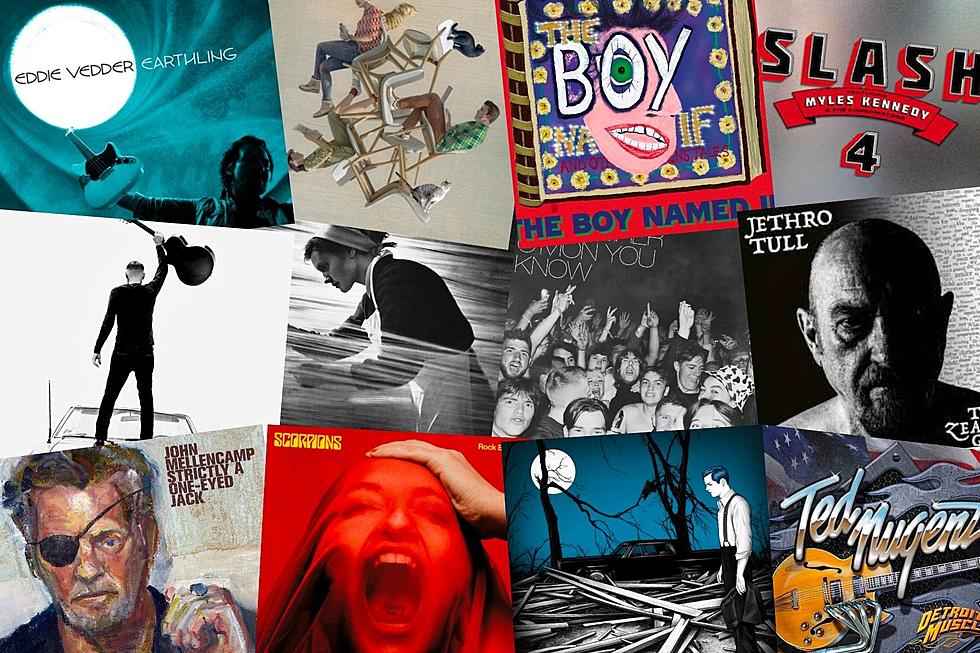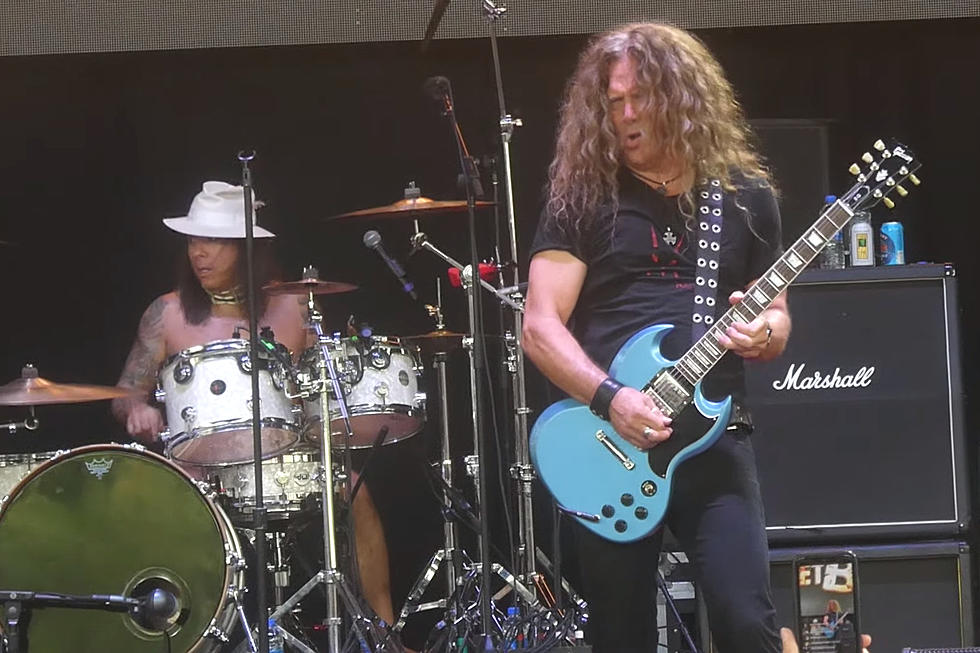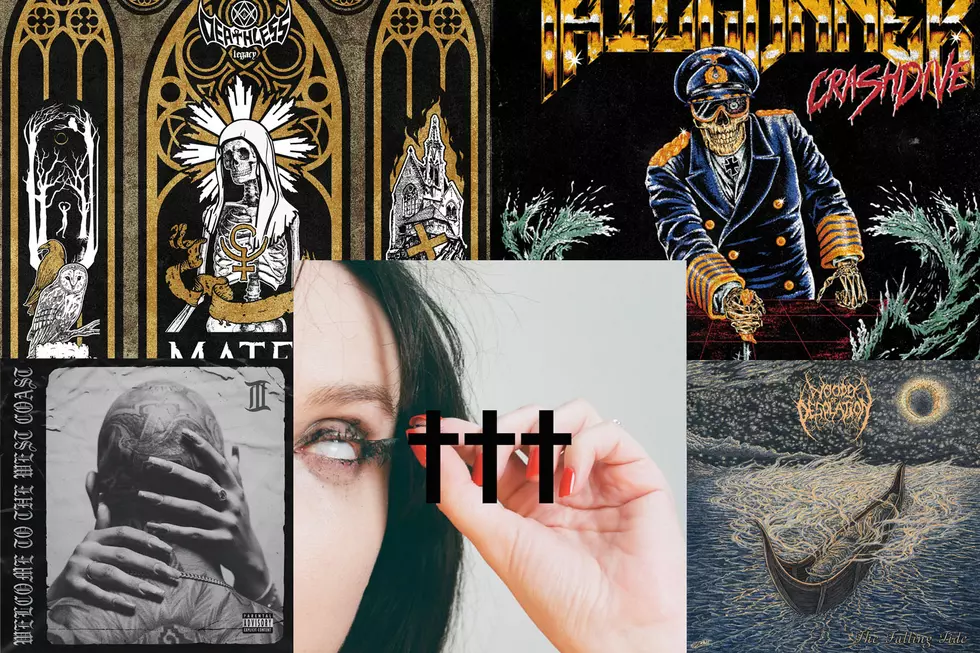
21 Important Rock Albums That Turn 50 This Month
Was something in the water in November 1970?
Sure, every month brings with it new releases from a variety of artists, some bound to become hits, others destined to be quickly forgotten. Still, with the benefit of hindsight, we’re now able to see that November 1970 was indeed a special time.
That month saw several significant releases from classic rock acts. In some cases, it marked a critical career turning point - as was the case for George Harrison, when he released his first post-Beatles LP, and David Bowie when he changed stylistic direction on The Man Who Sold the World. For others - such as J. Geils Band, Emerson, Lake & Palmer and Gentle Giant - debut albums would foreshadow the artists' future successes. Below we take a look at 21 Important Rock Albums That Turn 50 in November 2020.
1. All Things Must Pass - George Harrison
Just six months after the formal breakup of the Beatles, George Harrison released the most definitive musical statement of his career. No longer content to serve as the overlooked Quiet Beatle, Harrison, alongside producer Phil Spector, pulled out all the songwriting stops on All Things Must Pass. The single, "My Sweet Lord," reached No.1 in both the U.S. and U.K., making him the first Beatle to do so with a solo record. Harrison enlisted a long list of friends - including Eric Clapton, Ginger Baker, Peter Frampton, Klaus Voorman and dozens more - to play on the album. With his Fab Four days behind him at last, Harrison marked the end of an era with this album ... and the beginning of a brand new one.
2. The Man Who Sold The World - David Bowie
After his 1969 single "Space Oddity" became a hit, David Bowie was looking for a new direction. Trusted producer Tony Visconti urged him to channel his songwriting into something more concrete. He also introduced him to guitarist Mick Ronson, and the wheels began to turn. The Man Who Sold The World, unlike his last album, saw Bowie inching away from the safety of acoustic, folk rock and toward the weird, ironic and totally distinct.
3. Layla and Other Assorted Love Songs - Derek and the Dominos
After the dissolve of his late-'60s bands Cream and Blind Faith, Eric Clapton wasn't particularly interested in starting anything new. But after getting off the road with Delaney & Bonnie and Friends, he teamed up with keyboardist Bobby Whitlock to create Derek and the Dominos. Even though he hadn't intended on doing much beyond jamming with a few guys, Clapton, hopelessly in love with George Harrison's wife Pattie Boyd, ended up writing one of the most heartbreaking albums about unrequited love.
4. American Beauty - The Grateful Dead
In 1970, the Grateful Dead needed a miracle. Workingman's Dead, released just a few months earlier, was a step in the right direction. Hoping to once again hit the sweet spot between staying true to their sound and creating something with enough commercial appeal to pay the bills, American Beauty featured 10 uncharacteristically concise tracks that seemed to do the trick. Songs like "Sugar Magnolia," "Friend of the Devil" and "Truckin'" became instant classics.
5. His Band and the Street Choir - Van Morrison
After his third album, Moondance, enjoyed a fantastic reception, Van Morrison was keen to do it again with His Band and the Street Choir. When the higher-ups at Warner Bros. asked him for some radio-friendly content, he delivered. The lead single from the record, "Domino," a tribute to rock 'n' roll pioneer Fats Domino, reached No. 9; the second single, "Blue Monday," made it to No. 23.
6. Lola Versus Powerman and the Moneygoround, Part One - The Kinks
Boisterous and brash, the Kinks found themselves on the receiving end of a restraining order from the U.S. in 1965 and were banned from touring in the country for four years. When the restrictions finally lifted, the band used the clean slate to its advantage and released a new album about the music industry, Lola Versus Powerman and the Moneygoround, Part One. The single, "Lola," became a Top 10 hit, effectively reclaiming the Kinks' Stateside popularity.
Read More: How the Kinks Reclaimed America with Lola
7. No Dice - Badfinger
While the band's association with the Beatles certainly gave them a leg up, Badfinger had more to prove in 1970. Joey Molland joined the group on rhythm guitar, shifting the band's sound entirely into something more gritty and gutsy - a move that proved more than successful. No Dice went Top 30, the single "No Matter What" became the band's first Top 10 hit in the U.K. and the album included "Without You," which would go on to earn the band millions in royalties after Harry Nilsson's version went to No. 1.
8. Barrett - Syd Barrett
All good things must come to an end. Barrett was Syd Barrett's second solo album ... and his last. Even with a little help from his former Pink Floyd bandmates - David Gilmour served as producer, and Richard Wright played keyboards - Barrett's continuing struggle with mental illness made the task nearly impossible. The difficulty is palpable on Barrett, signaling that his creative days were close to over.
9. The J. Geils Band - The J. Geils Band
In the late '60s, the J. Geils Band attempted to capture their frantic live-show energy in the studio, a feat easier said than done. After months of trial and error and dozens of fruitless sessions, there was still no record. But then came Seth Justman, a fan who turned out to be pretty good on keyboards and one hell of a songwriter. Something clicked. When the band returned to the studio, the new original material Justman had helped spur along became their debut album. Even though the record didn't soar in sales, it provided the group with a leaping-off point for its next venture.
10. Loaded - The Velvet Underground
In 1970, Velvet Underground frontman Lou Reed was tired of being considered, well, underground. Hoping to make more substantial waves on mainstream radio, he toned down his usually abrasive songwriting attitude. But by the time the album was released, Reed had left the band and Loaded landed at an abysmal No. 202 on the chart. Still, tracks like "Sweet Jane" and "Rock & Roll," as well as the LP, became classics.
11. Live Album - Grand Funk Railroad
Grand Funk Railroad, enjoying a hot streak of numerous successful studio albums, gave listeners a treat with Live Album, a double-LP set that showcased performances from the band's recent, and super-successful, summer tour. Critics, as usual, were unimpressed, but fans couldn't get enough, and the album sold more than a half million copies in its first week.
12. Greatest Hits - Sly & the Family Stone
Pioneers of psychedelic soul, Sly & the Family Stone were one of the hottest bands on the market at the close of the '60s. Capitalizing off that success, Greatest Hits featured all the tunes fans loved, plus three additional songs that had been released as singles in 1969: "Hot Fun in the Summertime," "Everybody Is a Star" and "Thank You (Falettinme Be Mice Elf Agin)." The compilation album promptly went to No. 2 and became the band's most successful record.
13. Emerson Lake & Palmer - Emerson Lake & Palmer
Prog masterminds Emerson, Lake & Palmer hit the ground running with their debut self-titled album. Taking material from their hit set at the Isle of Wight Festival a couple months earlier, the band made a record full of dazzling performances and complex arrangements. Greg Lake offered the crown jewel of the album, "Lucky Man," a song he wrote when he was just 12 years old.
14. Play It Loud - Slade
Like many bands, Slade struggled at first to figure out just who they were. Given their debut album hadn't done as well as they'd hoped, the band attempted a new direction in 1970, adopting a skinhead look in an attempt to gain some publicity. (Skinheads at the time were known as tough, anti-hippie individuals, free from the racist connotations that exist today.) Play It Loud, an album of gritty, nearly unruly rock 'n' roll, fared poorly on the charts, but nevertheless pushed the band in a direction it needed to go.
15. Stephen Stills - Stephen Stills
After an immensely successful year, Crosby, Stills and Nash decided to take a hiatus and focus on solo projects. Stephen Stills wrote the majority of his LP in London, but when he brought the tracks back to the States, he couldn't help but enlist the assistance of some old friends. Stephen Stills includes Eric Clapton on “Go Back Home,” Ringo Starr on “To a Flame” and “We’re Not Helpless” and Cass Elliott singing backing vocals on several songs. The collaboration was worth it: The album went straight to No. 3.
16. Tea for the Tillerman - Cat Stevens
In the beginning of 1970, Cat Stevens was still a relatively unknown figure. His third album, Mona Bone Jakon, reached No. 164 on the chart, but everything changed seven months later, after he released Tea for the Tillerman, which went gold in both Stevens' native U.K. and in the U.S. The album included the hit Top 40 single, "Wild World," and effectively launched his career as one of the era's biggest and busiest singer-songwriters.
17. Twelve Dreams of Dr. Sardonicus - Spirit
For their fourth album, Spirit joined forces with producer David Briggs, a regular Neil Young collaborator and fellow southern Californian. The record fell short of expectations and peaked at only No. 63, their worst placement on the chart up to that point. But the album has since become the band's most acclaimed record, featuring Randy California's "Nature's Way," an impassioned plea for environmental understanding written in a single afternoon.
Read More: Top 10 Spirit Songs
18. Gentle Giant - Gentle Giant
Before they hit their stride in the mid-'70s, Gentle Giant had a few hurdles to clear. With some help from David Bowie's producer Tony Visconti, the band experimented a bit with its debut album, incorporating influences ranging from Led Zeppelin to Frank Zappa. The result was an eclectic mix of tracks that served as stepping stones to their next project.
19. Blows Against the Empire - Paul Kantner and Jefferson Starship
Internal issues within Jefferson Airplane led to a lull in activity for the band in 1970. Founding member Paul Kantner decided to use the time to create his own solo project, released as Blows Against the Empire and credited to himself and Jefferson Starship, a band that wouldn't be officially formed for another four years. With nothing really to lose, Kantner invited a throng of guests to play on the album, like David Crosby, Graham Nash, Jerry Garcia, Mickey Hart and Grace Slick.
Read More: Top 10 Paul Kantner Songs
20. Christmas and the Beads of Sweat - Laura Nyro
By the time New York-born singer and pianist Laura Nyro released her fourth album, Christmas and the Beads of Sweat, she was comfortable in her style. She enlisted the talents of several jazz greats like Alice Coltrane and Richard Davis but also included more mainstream Southern-based artists like Duane Allman and Roger Hawkins.
21. Starsailor - Tim Buckley
Of all the albums released during Tim Buckley's short lifetime, Starsailor was the one he was most passionate about. Even though he abandoned most of his folk tendencies and traded them in for a much more avant-garde and jazz style, the LP contained the popular "Song to the Siren," which has since been covered by a variety of artists, including Robert Plant and Bryan Ferry.
Top 100 '70s Rock Albums
More From Sasquatch 92.1 FM










